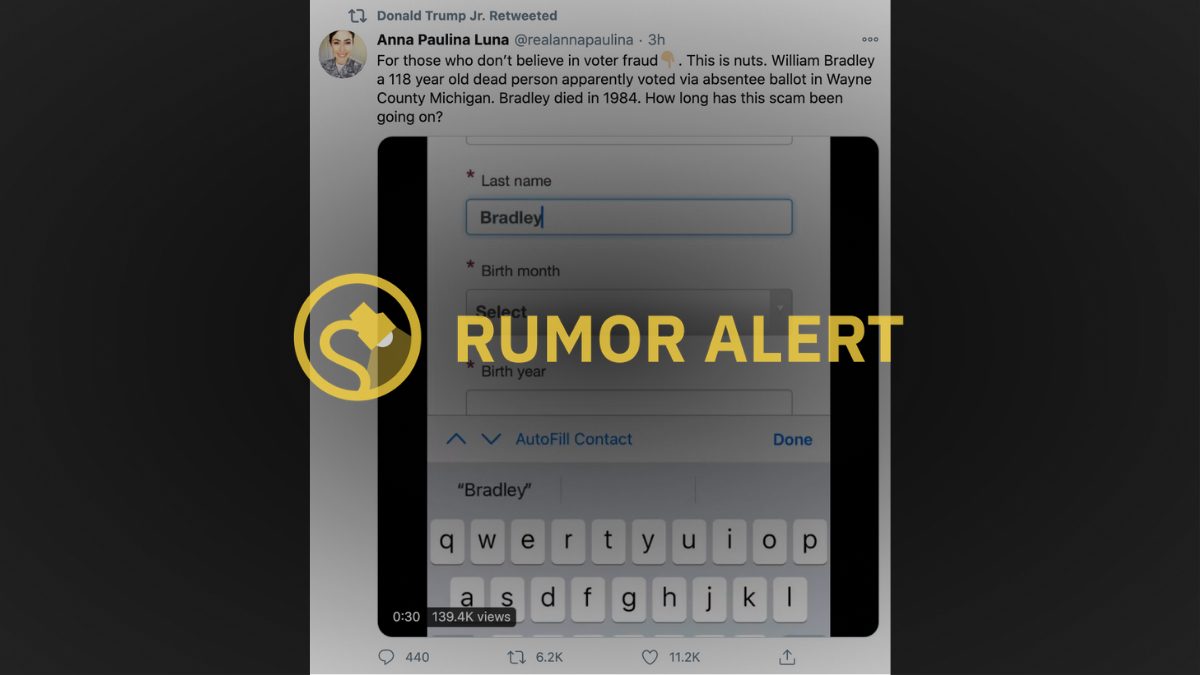[template id="223517"]
In the aftermath of Election Day amid widespread, unsubstantiated allegations and conspiracy theories of electoral fraud, figures from the reelection campaign of U.S. President Donald Trump promoted content that was presented as proof of electoral fraud in Michigan — namely that individuals who were deceased or implausibly old had voted in the state of Michigan.
The president's oldest son and campaign surrogate, Donald Trump Jr., promoted a tweet posted by @realannapaulina, who wrote:
For those who don’t believe in voter fraud.
This is nuts. William Bradley a 118 year old dead person apparently voted via absentee ballot in Wayne County Michigan. Bradley died in 1984. How long has this scam been going on?
Similar videos were published by Austin Fletcher, a right-wing online activist who uses the moniker "Fleccas," and in the UK, the pro-Brexit campaign Leave.EU promoted the "William Bradley" claim on Twitter.
Although we haven't yet been able to definitively determine whether this content is accurate or authentic, we have observed that it has certain traits that are often indicative of misinformation:
- The claim has been refuted by official sources.
- It appears this claim is being shared widely by only one political faction.
- The claim offers only one explanation for apparent incident or phenomenon, when other, less sinister explanations are plausible.
- This claim relates to alleged criminal conduct, but the relevant law enforcement agency (whether federal, state or local) hasn't yet reported the supposed incident.
- The caption or description associated with the image(s) or video appears designed to inflame the viewer's emotions.
The presence of those traits does not necessarily mean that the claim or content is bogus, but it does mean you should certainly be wary of sharing it online.
Here is what we do know:
Claims of widespread electoral fraud are very often politically motivated, and seize upon minor, rare, and isolated discrepancies or mistakes to make exaggerated allegations of "rampant" corruption or malfeasance. As Snopes has documented in the past, claims centering on "dead people voting," "dead people registered to vote" or "more voters registered than living adults" are especially prone to such misrepresentation, and are typically explained by either clerical and record-keeping errors, or the citation of out-of-date voter registration records.
In response to our inquiries, a spokesperson for Michigan's secretary of state effectively refuted claims that the content in question constituted evidence of electoral fraud. In an emailed statement sent to Snopes, the spokesperson explained that, even where discrepancies or clerical errors take place, safeguards are in place that ensure that no invalid ballots are counted:
Ballots of voters who have died are rejected in Michigan, even if the voter cast an absentee ballot and then died before Election Day. On rare occasions, a ballot received for a living voter may be recorded in a way that makes it appear as if the voter is dead. This can be because of voters with similar names, where the ballot is accidentally recorded as voted by John Smith Sr when it was actually voted by John Smith Jr; or because of inaccurately recorded birth dates in the qualified voter file; for example, someone born in 1990 accidentally recorded as born in 1890. In such scenarios, no one ineligible has actually voted, and there is no impact on the outcome of the election. Local clerks can correct the issue when it is brought to their attention.
[template id="223522"]

